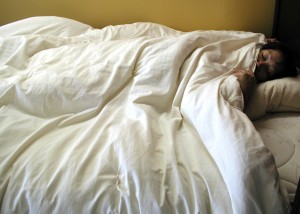The relation between sleep deprivation and weight gain is debatable, however there is some science behind the concept of it. The important question everyone has been asking since the beginning of sleep study is whether or not sleep has any physiological effects. A recent study performed on rats in which the experimental group went a substantial amount of time without sleep while the control group received time to sleep indicated paramount conclusions. The results were clear: sleep distress increased the likelihood of severe debilitation and even death in those who were part of the experimental group, while the control group suffered no consequences.
What is also significant about sleep studies is that after even one night of sleep destitution one's ghrelin levels may rise. Ghrelin is a chemical produced to alert us of whether or not we are hungry and need food. Reports show that after 3 nights of sleep regulation (7 hours the first night, 4.5 hours the second night, and total sleep restriction on the last night) men with a normal BMI stated that they felt a remarkably stronger feeling of hunger. The science behind it cleared up that ghrelin levels were indeed at a much higher percentage after sleep deprivation than after a normal 7 - 8 hour rest period.
Whether or not comfort has an affect on ghrelin levels is unsettled. But comfort in bedding material surely can help one fall asleep easier - and for all the right reasons. While America once held the record as the most obese nation (only to be lost to Mexico in March of 2013) it is still alarming the percentage of overweight adults in the country (35.7% are obese.) These statistics could be correlated to the fact that over the past few decades the average American is sleeping at least two hours less than those who survived in the early to mid twentieth century.
Better amenity in sleeping hours can induce a deeper, more relaxed sleep which can help in relieving one's body of grogginess and discomfort in the early morning hours. While sleeping healthier stimulates the body's natural sleep cycle it will also reduce stress levels which can eliminate unnecessary feelings of hunger and the need for oral fixations such as smoking and drinking. Some research suggest that the time spent sleeping and also the QUALITY of one's sleeping hours can actually affect weight LOSS! This is because when a person gets the proper amount of rest their ghrelin levels decrease while their leptin levels (which are produced in fat cells and send signals to the brain alerting one that they are full) increase.
Even though research on the correlation between sleep and weight loss is still up in the air, many experts agree that if you are working on a diet, putting in a few extra hours of sleep certainly will not hurt. Director of the Connecticut Center for sleep medicine Dominic Roca says that "more and more data comes to the forefront to suggest that you simply can't cut back on sleep without paying some price."
 Eric is currently a student and part-time team member for Norfolk, VA based business Organic Comfort Zone, manufacturers of CozyPure organic bedding and mattress. For more information visit organiccomfortzone.com or cozypure.com or call 757.480.8500.
Eric is currently a student and part-time team member for Norfolk, VA based business Organic Comfort Zone, manufacturers of CozyPure organic bedding and mattress. For more information visit organiccomfortzone.com or cozypure.com or call 757.480.8500.


